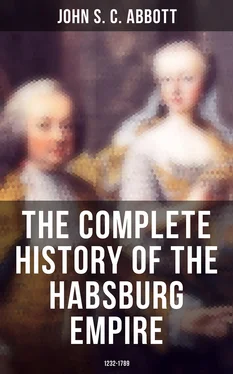Such was the state of this great religious controversy when Charles V. held his first diet at Worms. The pope, wielding all the energies of religious fanaticism, and with immense temporal revenues at his disposal, with ecclesiastics, officers of his spiritual court, scattered all over Europe, who exercised almost a supernatural power over the minds of the benighted masses, was still perhaps the most formidable power in Europe. The new emperor, with immense schemes of ambition opening before his youthful and ardent mind, and with no principles of heartfelt piety to incline him to seek and love the truth, as a matter of course sought the favor of the imperial pontiff, and was not at all disposed to espouse the cause of the obscure monk.
Charles, therefore, received courteously the legates of the pontiff at the diet, gave them a friendly hearing as they inveighed against the heresy of Luther, and proposed that the diet should also condemn the reformer. Fortunately for Luther he was a subject of the electorate of Saxony, and neither pope nor emperor could touch him but through the elector. Frederic, the Duke of Saxony, one of the electors of the empire, governed a territory of nearly fifteen thousand square miles, more than twice as large as the State of Massachusetts, and containing nearly three millions of inhabitants. The duchy has since passed through many changes and dismemberments, but in the early part of the sixteenth century the Elector of Saxony was one of the most powerful princes of the German empire. Frederic was not disposed to surrender his subject untried and uncondemned to the discipline of the Roman pontiff. He accordingly objected to this summary condemnation of Luther, and declared that before judgment was pronounced, the accused should be heard in his own defense. Charles, who was by no means aware how extensively the opinions of Luther had been circulated and received, was surprised to find many nobles, each emboldened by the rest, rise in the diet and denounce, in terms of ever-increasing severity, the exactions and the arrogance of the court of Rome.
Notwithstanding the remonstrances of the pope's legates, the emperor found it necessary to yield to the demands of the diet, and to allow Luther the privilege of being heard, though he avowed to the friends of the pope that Luther should not be permitted to make any defense, but should only have an opportunity to confess his heresy and implore forgiveness. Worms, where the diet was in session, on the west banks of the Rhine, was not within the territories of the Elector of Saxony, and consequently the emperor, in sending a summons to Luther to present himself before the diet, sent, also, a safe conduct. With alacrity the bold reformer obeyed the summons. From Wittemberg, where Luther was both professor in the university and also pastor of a church, to Worms, was a distance of nearly three hundred miles. But the journey of the reformer, through all of this long road was almost like a triumphal procession. Crowds gathered everywhere to behold the man who had dared to bid defiance to the terrors of that spiritual power before which the haughtiest monarchs had trembled. The people had read the writings of Luther, and justly regarded him as the advocate of civil and religious liberty. The nobles, who had often been humiliated by the arrogance of the pontiff, admired a man who was bringing a new power into the field for their disenthrallment.
When Luther had arrived within three miles of Worms, accompanied by a few friends and the imperial herald who had summoned him, he was met by a procession of two thousand persons, who had come from the city to form his escort. Some friends in the city sent him a warning that he could not rely upon the protection of his safe conduct , that he would probably be perfidiously arrested, and they intreated him to retire immediately again to Saxony. Luther made the memorable reply,
"I will go to Worms, if as many devils meet me there as there are tiles upon the roofs of the houses."
The emperor was astonished to find that greater crowds were assembled, and greater enthusiasm was displayed in witnessing the entrance of the monk of Wittemberg, than had greeted the imperial entrance to the city.
It was indeed an august assemblage before which Luther was arrayed. The emperor himself presided, sustained by his brother, the Archduke Ferdinand. Six electors, twenty-four dukes, seven margraves, thirty bishops and prelates, and an uncounted number of princes, counts, lords and ambassadors filled the spacious hall. It was the 18th of April, 1521. His speech, fearless, dignified, eloquent, unanswerable, occupied two hours. He closed with the noble words,
"Let me be refuted and convinced by the testimony of the Scriptures or by the clearest arguments; otherwise I can not and will not recant; for it is neither safe nor expedient to act against conscience. Here I take my stand. I can do no otherwise, so help me God, Amen."
In this sublime moral conflict Luther came off the undisputed conqueror. The legates of the pope, exasperated at his triumph, intreated the emperor to arrest him, in defiance of his word of honor pledged for his safety. Charles rejected the infamous proposal with disdain. Still he was greatly annoyed at so serious a schism in the Church, which threatened to alienate from him the patronage of the pope. It was evident that Luther was too strongly intrenched in the hearts of the Germans, for the youthful emperor, whose crown was not yet warm upon his brow, and who was almost a stranger in Germany, to undertake to crush him. To appease the pope he drew up an apologetic declaration, in which he said, in terms which do not honor his memory,
"Descended as I am from the Christian emperors of Germany, the Catholic kings of Spain, and from the archdukes of Austria and the Dukes of Burgundy, all of whom have preserved, to the last moment of their lives, their fidelity to the Church, and have always been the defenders and protectors of the Catholic faith, its decrees, ceremonies and usages, I have been, am still, and will ever be devoted to those Christian doctrines, and the constitution of the Church which they have left to me as a sacred inheritance. And as it is evident that a simple monk has advanced opinions contrary to the sentiments of all Christians, past and present, I am firmly determined to wipe away the reproach which a toleration of such errors would cast on Germany, and to employ all my powers and resources, my body, my blood, my life, and even my soul, in checking the progress of this sacrilegious doctrine. I will not, therefore, permit Luther to enter into any further explanation, and will instantly dismiss and afterward treat him as a heretic. But I can not violate my safe conduct, but will cause him to be conducted safely back to Wittemberg."
The emperor now attempted to accomplish by intrigue that which he could not attain by authority of force. He held a private interview with the reformer, and endeavored, by all those arts at the disposal of an emperor, to influence Luther to a recantation. Failing utterly in this, he delayed further operations for a month, until many of the diet, including the Elector of Saxony and other powerful friends of Luther, had retired. He then, having carefully retained those who would be obsequious to his will, caused a decree to be enacted, as if it were the unanimous sentiment of the diet, that Luther was a heretic; confirmed the sentence of the pope, and pronounced the ban of the empire against all who should countenance or protect him.
But Luther, on the 26th of May, had left Worms on his return to Wittemberg. When he had passed over about half the distance, his friend and admirer, Frederic of Saxony, conscious of the imminent peril which hung over the intrepid monk, sent a troop of masked horsemen who seized him and conveyed him to the castle of Wartburg, where Frederic kept him safely concealed for nine months, not allowing even his friends to know the place of his concealment. Luther, acquiescing in the prudence of this measure, called this retreat his Patmos, and devoted himself most assiduously to the study of the Scriptures, and commenced his most admirable translation of the Bible into the German language, a work which has contributed vastly more than all others to disseminate the principles of the Reformation throughout Germany.
Читать дальше












